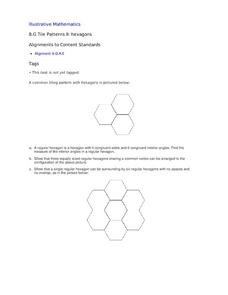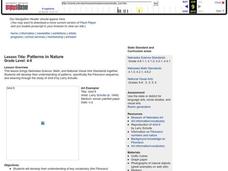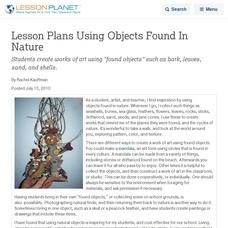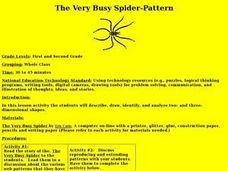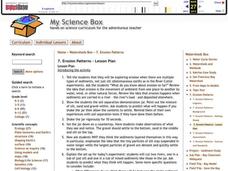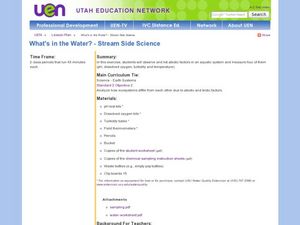Curated OER
Where in the Wild?
Students investigate the purpose of animals' ability to camouflage. In this animal science lesson, students read the text Where in the Wild? and identify animals that are predators and prey. Students discuss how camouflage is necessary...
Curated OER
Energy Resources: Where Are They and How Do We Get Them?
Future energy engineers visit several stations, each one dedicated to a different alternative source of energy. They describe how solar energy is converted into other forms of energy, the patterns of distribution of energy resources in...
Curated OER
Lao Design: Lotus Flower Constructions
Students create lotus flowers in 3-D designs applying Lao art techniques. Following a teacher demonstration, they assemble their own lotus flower candleholders and the teacher arranges a group flotation in a body of water. Students...
Curated OER
Paper Clay Leaves
Using real leaves to imprint clay, your class will see a natural effect on their individual projects. This is a fabulous way to study leaf anatomy in science. Or, you can focus on mixing colors to recreate the original. These leaves can...
Curated OER
Tile Patterns II: Hexagons
After learning that the sum of interior angles for triangles is 108 degrees, take it further to show that the sum of angles in any polygon is the same! Using hexagons, pupils practice finding the measure of the six congruent angles. Make...
Virginia Department of Education
Mendelian Genetics
How did Mendel know which pea plants would demonstrate certain characteristics? Pupils explore the answer this question, among others, as they complete Punnet squares, research dominant and recessive traits, and explore hereditary...
Curated OER
Check Out Community Preparedness
Students research storm preparedness in local community, identify ways citizens are notified of impending weather emergencies, contact city administrators to discuss disaster plan and whether it has ever been implemented, and interview...
Concord Consortium
Here Comes the Sun
Many phenomena in life are periodic in nature. A task-based lesson asks scholars to explore one of these phenomena. They collect data showing the sunrise time of a specific location over the period of a year. Using the data, they create...
Curated OER
Patterns in Nature
Students learn about artist Larry Schulte and view examples of his work. They create addition sentence for the first seven numbers of the fibonacci sequence and use unifix cubes to build that sentences. Students color and create three...
Curated OER
Lesson Plans Using Objects Found In Nature
Students create works of art using "found objects" such as bark, leaves, sand, and shells.
Curated OER
The Greatest Show on Earth: The World's Smallest Animals
Students create instruments to capture different types of insects. In this The Greatest Show on Earth: The World's Smallest Animals lesson, students compare the attributes of certain insects and record the data on a chart. After catching...
Curated OER
The Hydrologic (Water) Cycle
Learners construct a model of the hydrologic cycle, and observe that water is an element of a cycle in the natural environment. They explain how the hydrologic cycle works and why it is important, and compare the hydrologic cycle to...
Curated OER
Symmetry In Nature
Students investigate the symmetry that is found in nature. They view shapes and patterns in nature while looking at images. Students look for tessellations while obtaining photographs with a digital camera. The information is used for...
Curated OER
The Very Busy Spider-Pattern
Students explore two- and three-dimensional shapes. In this very busy spider lesson, students read the story and then create a spider web pattern of their own. The webs must use a symmetrical pattern. Additional activities for patterns...
Curated OER
Nature Walk Poem
Third graders read poetry inspired by nature. They talk a walk in nature or in their neighborhood with paper and pen and write down feelings and perceptions. They write a poem about their walk and share it with the class.
Curated OER
Natural Selection
Kids act as scientists and preditors in this short natural selection activity; they collect and analyze data, then apply their new knowledge to real-world examples of natural selection. The layout of the worksheet is easy enough to use...
Curated OER
Erosion Patterns
Students explore erosion when there are multiple types of sediments. They view a soil separation demonstration jar before and after agitation to determine how and why the layers settled. In addition, they conduct experiments with a river...
NOAA
To Explore Strange New Worlds
It's time to boldly go where your class has not gone before! The introductory lesson in a five-part series takes young oceanographers aboard the NOAA Ship Okeanos to begin a study of ocean exploration. The lesson includes a comparison of...
Curated OER
Jazz in America Lesson Plan 8
Students explore the present and juture of jazz. They identify terms associated with jazz and listen to contemporary recordings. They participate in a class discussion regarding jazz's contribution to and reflection of American culture...
Curated OER
What's in the Water? - Stream Side Science
Here is a complete activity in which young biologists or ecologists test the pH, dissolved oxygen, turbidity and temperature of stream water. The class visits an actual stream and makes observations of the site. They use scientific...
Curated OER
Look for Patterns: Quilts in Two Faith Ringgold Stories
Author Faith Ringgold uses quilts to illustrate her books Tar Beach and Aunt Harriet's Underground Railroad. In this integrated trio of activities, young scholars read stories, identify and create patterns, and design quilt squares of...
Curated OER
The Climate Change Skeptic's Argument: Natural Solar Cycles or Human Activity?
Teachers explore patterns in sunspots and total solar irradiance to understand the counterpoint to the human effect of global warming. In this professional development tool, teachers work through a lesson on the sun's natural patterns to...
Curated OER
VARVES: Dating Sedimentary Strata: Geology, Paleontological Patterns
Students count the number of varves (annual layers of sediment) in shale billets, taken from the Green River Formation in Wyoming. The count is then extended to reflect the entire 260 meters of sediments where the billets originated.
Curated OER
Natural Resources
Learners explore Iowa geography and topographic maps. In this geography and topographic maps lesson, student investigate maps, newspapers, Iowa flora and fauna. Students gain an understanding of how different landforms can be identified...
Other popular searches
- Art Patterns in Nature
- Growing Patterns in Nature
- Science Patterns in Nature
- Patterns in Nature Fibonacci
- Changing Patterns in Nature
- Number Patterns in Nature
- Patterns in Nature Seeds
- Nature's Patterns in Math






